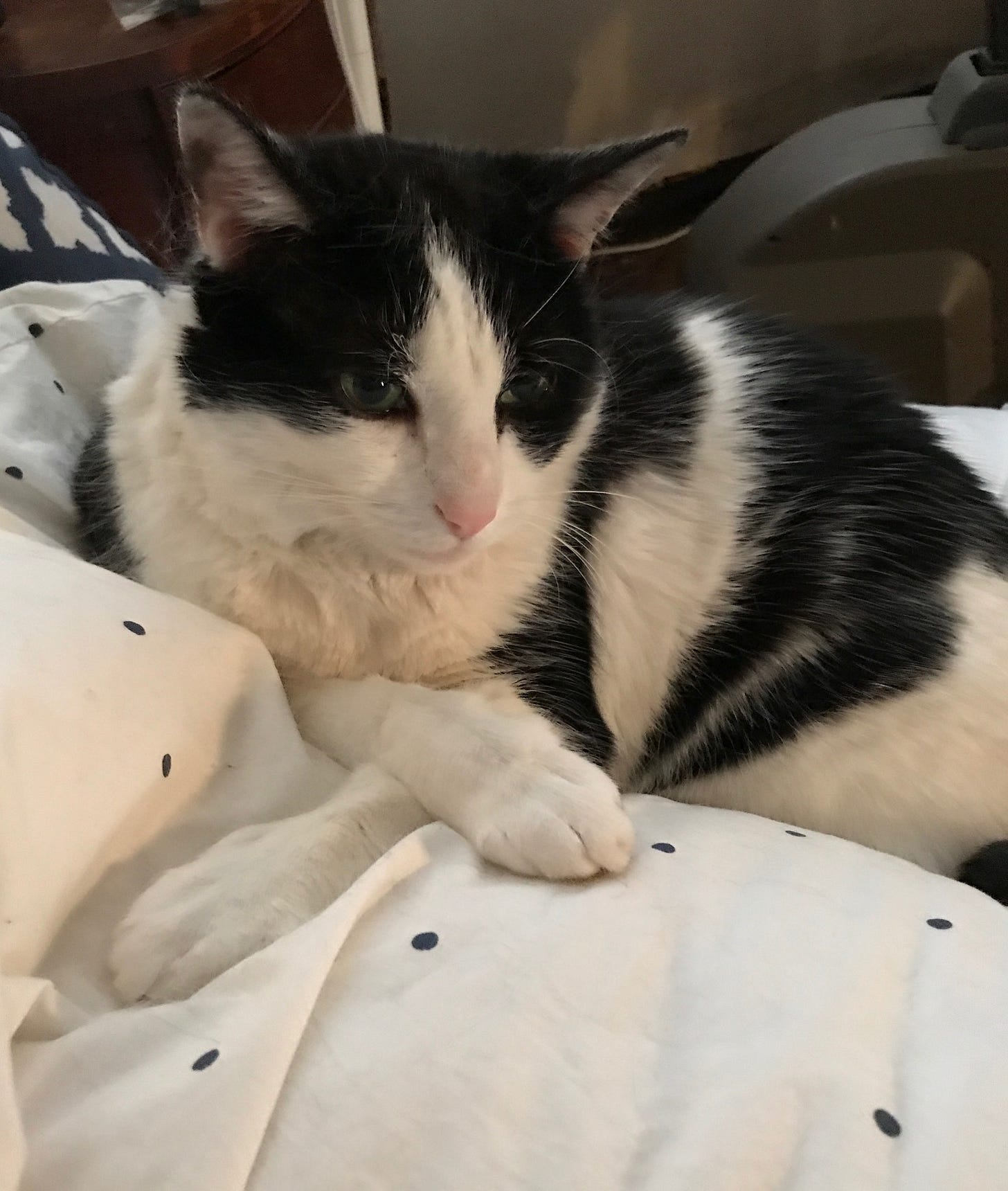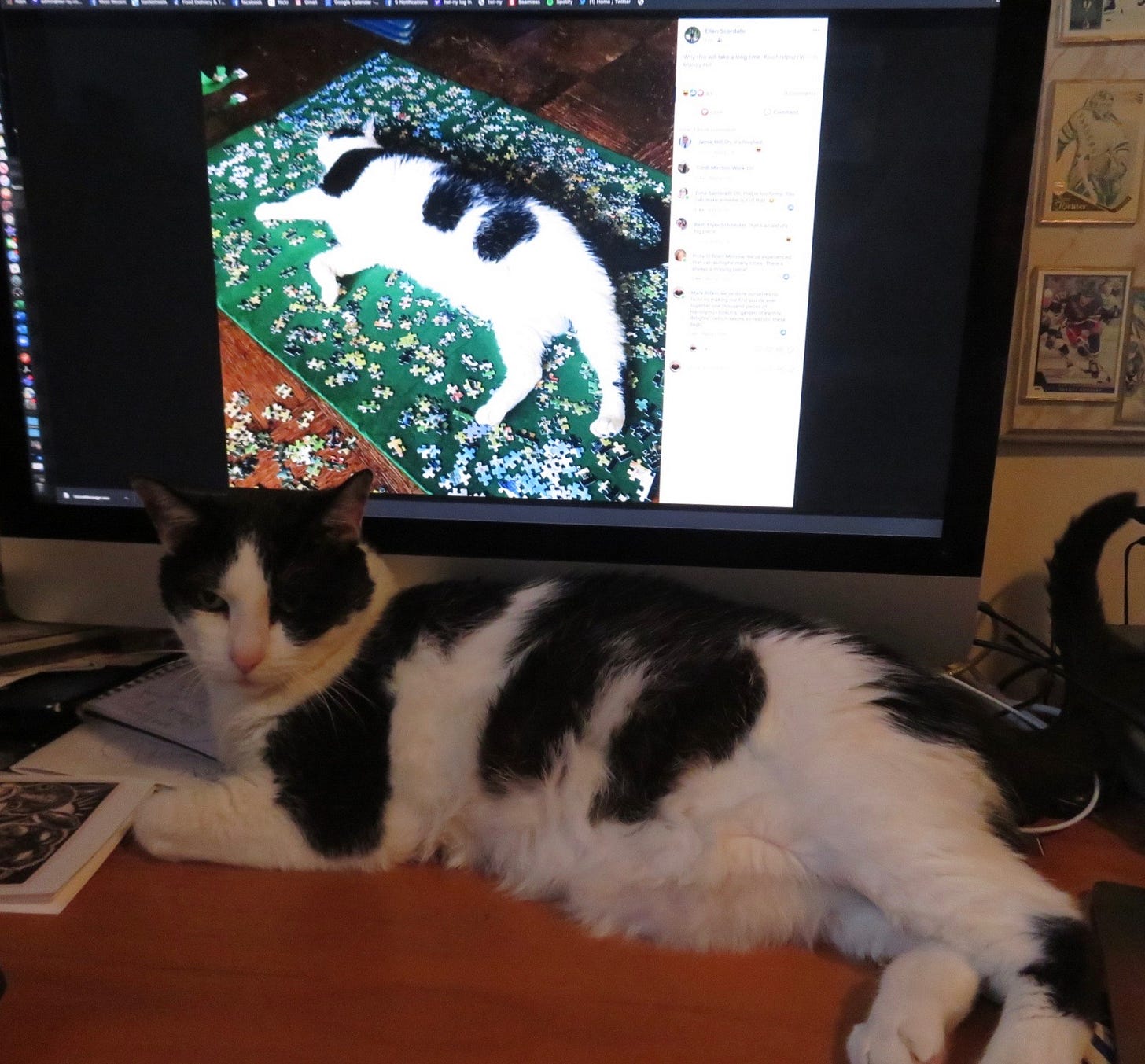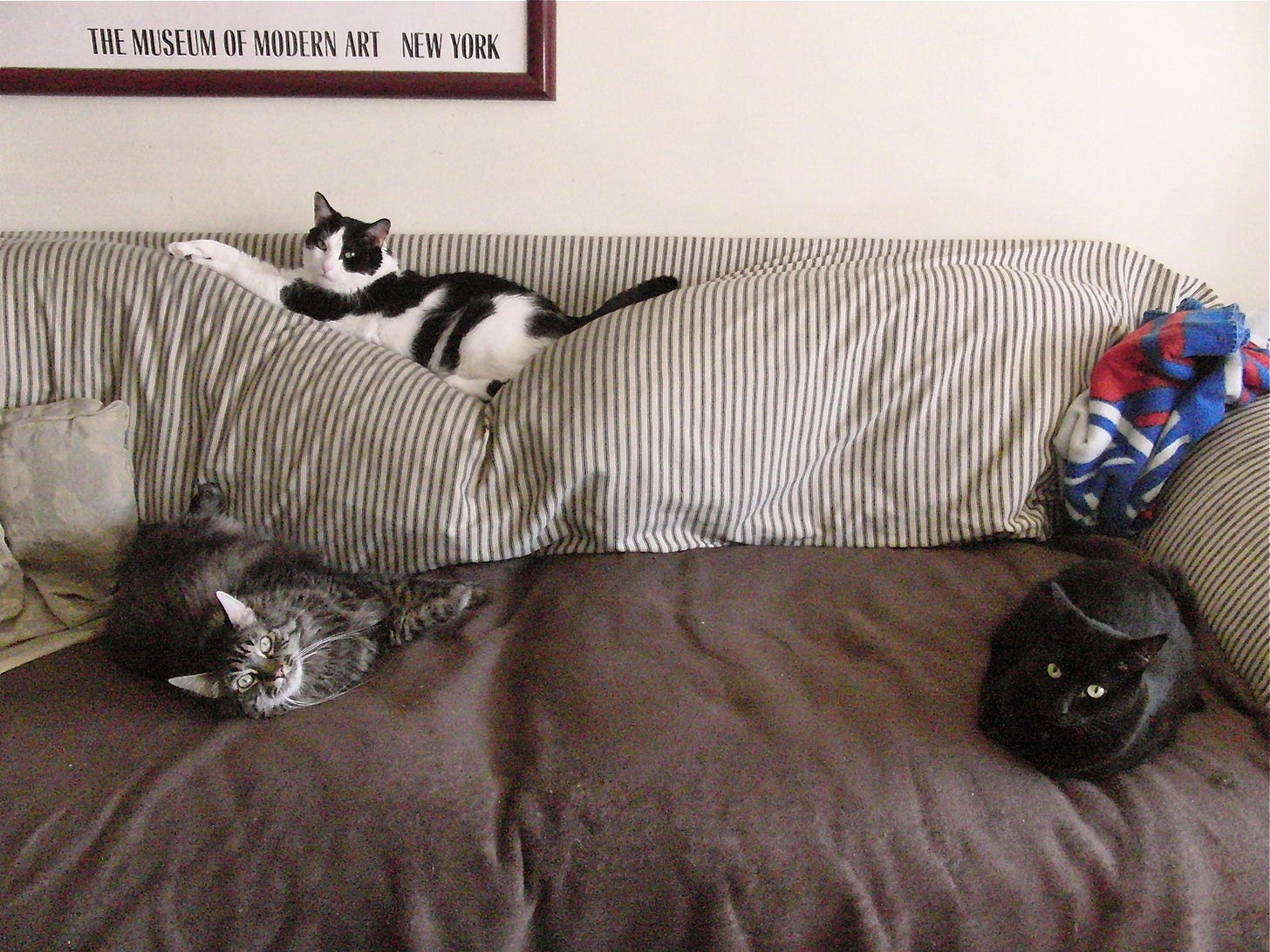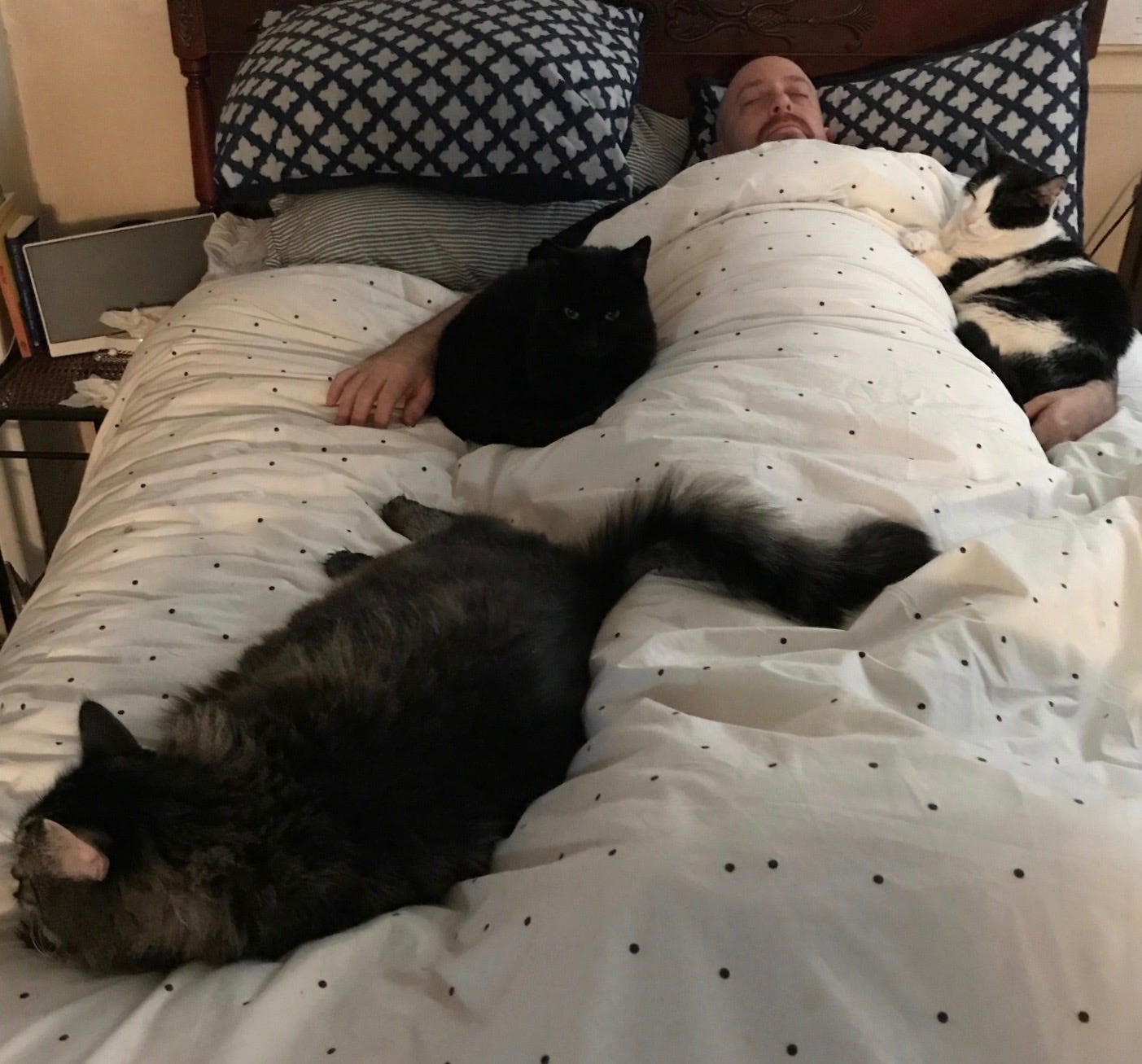the queen is dead. long live the queen.
Queen Vashti is dead. Long live Queen Vashti.
This one is not going to be easy — not that the others were, but this marks the end of an era for us.
On July 31, 2023, Ellen and I said farewell to our beloved Taeko, who went peacefully in her sleep at the age of thirteen.
On March 13, 2024, we said goodbye to our special LBK, Haruki, who went peacefully in his sleep at the age of fifteen.
And now, on July 23, 2024, we have lost our dear, dear Vashti, who went peacefully in her sleep at the age of seventeen.
It’s not supposed to happen like this, three treasured pets dying within one year, and in the opposite order of their birth. It really is too much.
Death, supposedly, comes in threes. Or at least that’s what the old folktale says.
We as a species have apophenia; we seek out meaningful connections in random occurrences, one of which is grouping celebrity deaths in threes, which follows a storytelling convention.
“The rule of three is a writing principle based on the idea that humans process information through pattern recognition,” MasterClass notes. “As the smallest number that allows us to recognize a pattern in a set, three can help us craft memorable phrases. The rule of three is also incredibly useful as a structural tool: comedians use the rule of three to craft three-part jokes (set up, build anticipation, punch line) and screenplays generally follow a three-act structure.”
We adopted Vashti in 2008, soon after our amazing tuxedo hedonist Shinsan let out a death rattle that still haunts the front closet, leaving our brilliantly manipulative orange tabby Mooshu by himself. We went to City Critters at the old Petco in Kips Bay and fell in love with Vashti from the moment she was put in Ellen’s arms.
Ellen wanted to name her Cow because of her white fur with black markings, but that didn’t work for me. It was Purim, so I thought a better name might be Vashti, the queen of Persia who defied her husband, King Ahasuerus, in what Harriet Beecher Stowe wrote in her 1878 book Bible Heroines was the “first stand for woman’s rights.”
Thanks to Monty Python and the Holy Grail, I know that “cow” in French is “vache” — when the French Taunter ridicules King Arthur and his knights and they refuse to turn away, the silly soldier calls out to his men, “Fetchez la vache,” or “Get the cow,” catapulting a large bovine in their specific direction — so Ellen and I agreed that Vashti, also known as Vash and Vashtala, was the right name.
Vashti asserted her identity instantly; for the sixteen years she was with us, she wanted to be a solo cat, but she learned to be sweet to the ailing Mooshu in his last weeks, hissed daily at Haruki so he would leave her alone, utterly ignored Taeko’s existence, and tried to eviscerate Tuki. (It took a harrowing three months of intense training to get them to be in the same space together.) She had similar traits to her brother Marvin, who was a therapy cat; when we found him on Facebook, we arranged a visit to Marvin’s Brooklyn home, but it was not a big-time family reunion, more of a Mexican standoff.
To me, Vashti was nothing but sweet and loving, almost possessive; Ellen believes that Vashti and I must have had some kind of relationship in a previous incarnation. When we sat on the couch and watched television, Vashti would sit on the cushiony top and spread out between us, resting her face on the back of my hand. Every night, she would jump on the bed, cuddle in next to me, give Ellen a jealous look, then put her head on my chest and reach a paw across my stomach, like a lover would.
She was a dairy cat who was allergic to fish; it was impossible for us to eat cheese or yogurt without her demanding some. She had an affinity for chewing on plastic; every time I went to the bathroom, she would hop on my lap, lick and bite the inside clear shower curtain, then relax on me for a while. When I took a bath, she would sit on Ellen’s lap; the other cats knew that this was Vashti’s time, not theirs.
Vashti had a cool, commanding strut that spoke volumes, primarily saying, “Yeah, so?” She never knocked things over. She loved hanging out with visitors. When we were having work done on our apartment, she enjoyed staying in a hotel with us. She went for long walks down the hallway. She crossed her paws in beautiful ways.
She began steadily losing weight last fall. We tried various pills and shots and special food, but nothing seemed to help. It wasn’t her thyroid, or diabetes, or tumors; our longtime expert vet ran all the tests and scans. In the last few months, she could no longer digest anything; she would leave us presents in interesting places around the apartment, creating the world’s worst treasure hunt.
Through it all, she never complained. She reveled in her trips to the vet, regally sitting in the front of her pet stroller and peering out like she was the queen of the neighborhood surveying her devoted flock. She followed me around, sitting at my feet wherever I was. She went from eleven pounds down to six, despite an absolutely ravenous appetite. We regularly checked in with the vet to make sure we were doing the right things and asking if there was any more we could try.
The final few days were difficult, but she was still sticking close to us. I was home sick with Covid — after getting a booster — so Vashti and I were together nonstop. I couldn’t spend too much time at the computer because the Covid was making me dizzy, and my laptop had fallen victim to the CrowdStrike blue screen of death.
Ellen and I were considering bringing Vashti to the vet to be put down, but we wanted to give her the chance to go on her terms. On Monday night, Vashtala was able to get onto the bed even though her legs were weakening. She came over to me and, for the first time in many, many months, cuddled in beside me. I put my arm around her and felt her calm breathing. I woke up in the middle of the night, and she had barely moved; she was prepared for whatever comes next.
In the morning, she remained on the bed. Ellen brought her laptop into the bedroom and worked next to her, playing soothing music. My laptop couldn’t be fixed remotely, so I had to go to the office, which was okay because I had tested negative for Covid.
I had a feeling that maybe Vash would go while I was away; Mooshie appeared to wait for both Ellen and me to be out of the apartment before passing. A hospice nurse once told a friend that she’d often seen a dying person seem to wait to pass until their loved ones were out of the room.
Mere seconds after my computer was fixed, Vashti left.
I came home and said goodbye to my one and only Vashtala, who was laying peacefully on the bed in that same spot.
Three in one year; it’s not supposed to happen like this.
Ellen and I are devastated.
The obsession with the number three also relates to the idea that everything has a beginning, a middle, and an end. According to neuroscientist David Eagleman in his 2009 book Sum: Forty Tales from the Afterlives, we each die three times: “The first is when the body ceases to function. The second is when the body is consigned to the grave. The third is that moment, sometime in the future, when your name is spoken for the last time.”
We’ll be saying the name and sharing the story of Vashti — and Haruki, and Taeko, and Mooshu, and Shinsan, and the amazing Goat — far into the future.
The queen is dead. Long live the queen.
[You can follow Mark Rifkin and This Week in New York every day here.]







Oh, Mark, I am so sorry to hear about Vashti, how heartbreaking. You wrote about her beautifully, a wonderful tribute. Sending a big hug to you and Ellen. I love that photo of you and the three cats.
Sad that Vashti has crossed the Rainbow Bridge. Know that she takes you and Ellen with her in her heart until . . .